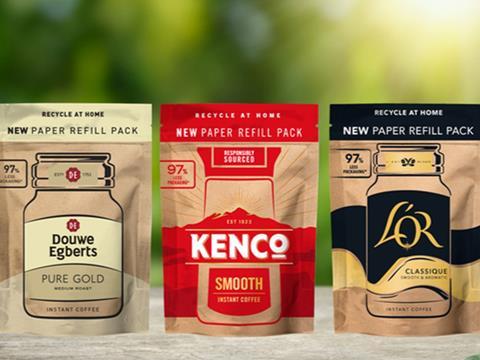
JDE Peet’s coffee brands Kenco, Douwe Egberts, and L’OR are introducing paper refill packs to retailers in the UK and Ireland in a bid to achieve home recyclability for instant coffee packaging.
Compared to a standard 200g glass jar, the refill pack constitutes 97% less packaging and is made of over 85% paper – making it disposable in home recycling bins and, it is hoped, reducing packaging waste. At the same time, it is said to keep coffee fresh for 15 months to ensure that the new, sustainability-minded packaging design doesn’t impact the taste and quality of the product.
The new packaging is set to replace the existing plastic packaging for Kenco and Douwe Egberts and, for the first time, will transition the L’OR brand into a refill format. Starting this month, the paper pouches will be launched across various major retailers in the UK and Ireland.
JDE Peet’s claims to be the first major UK coffee brand to embrace paper refills for its coffee products. The transition is set to contribute towards the company’s sustainability targets – including its Common Grounds Programme, which intends to minimize its footprint and ‘positively impact people, the planet and the future of coffee and tea’.
“We’re delighted to launch our new home recyclable paper refills,” says Roberto De Felice, marketing director, UK & Ireland. “Research shows consumers want to embrace reusable and refillable packaging, 76% of shoppers are looking to recycle more – but ‘ease of recycling’ can be a significant barrier.
“Our new packs will help empower consumers to make greener choices by making it easier to recycle and driving wider adoption of refills - reducing packaging waste and removing plastic from retail supply chains. Taking this crucial stride confirms our commitment to advancing our sustainability goals to make 100% of our packaging reusable, recyclable or compostable by 2030.”
Kenco was apparently the first coffee brand to launch the refill format in 2009. Today, it claims to be the market leader with a 79% share of instant coffee refills, delivering over £25 million RSV every year.
A similar breakthrough emerged when Nescafé released its instant coffee refill pouch last year. Reportedly, the pack is recyclable, contains an average of 60% less plastic than the lid of a 200g glass coffee jar, and cuts down on unnecessary packaging.
Also, coffee roaster Löfbergs previously entered a collaboration with Amcor to develop a mono-material coffee pouch. The pack is said to be both mechanically and chemically recyclable and facilitate a 55% reduction in carbon footprint.
If you liked this article, you might also enjoy:
The Lidl approach to packaging sustainability
How did Brazil achieve its 100% aluminium can recycling rate – and can it be replicated in the EU?
Experts have their say on the EU’s Packaging and Packaging Waste Directive revisions
A deep dive into the most important packaging sustainability trends and solutions













No comments yet